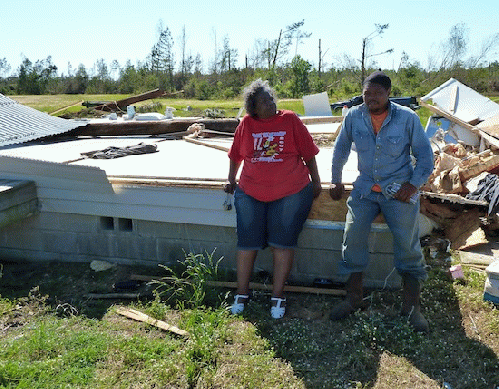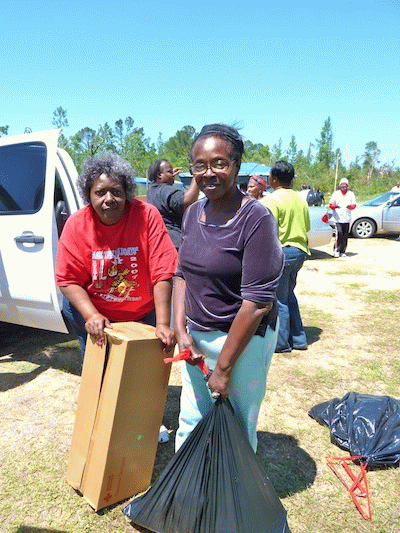On a beautiful late afternoon in early May, Dedrick Benison and Michael Calvin are quietly surveying the house that came crashing down around them just a week before. On April 27th they were watching a movie here, a neighbor's house on the catfish farm where the men live and work, near Forkland, Alabama. Moments later a tornado collapsed the roof and ripped off the kitchen wall, sending furniture and splintered wood flying. The men scrambled out a living room window to escape.
As terrifying as it was, the evening could have gone much worse for the roommates. We walk no more than 30 yards away, to all that's left of the small two-bedroom they shared - the house where, but for a seemingly mundane decision, they would have been that evening.
"This is the house," Benison, 31, points to its tile-floored footprint. "This is the sides and top," he gestures towards a mound of debris piled a couple of feet away, once a roof, walls, and furniture.
Ethel Giles, a neighbor and community leader who is there to deliver donated supplies, states the obvious: "Good thing you felt like watching a movie."
Calvin, 26, expresses a similar sentiment, gratitude for merely having survived. "It just breaks my heart," he says "But I'm still here. I'm still here."

Ethel Giles and Dedrick Benison lean against what's left of Benison's house.Stil
(Image by Ada McMahon / Bridge the Gulf Project) Details DMCA
Ethel Giles and Dedrick Benison lean against what's left of Benison's house.Stil by Ada McMahon / Bridge the Gulf Project
Ethel Giles and Dedrick Benison lean against what's left of Benison's house.
Still here, but left with what? No home, disrupted work (the catfish farm was wrecked as well), and not much by way of food or clothing. Benison's truck survived, but Calvin's was flattened.
For now, they're depending on government and private agencies like FEMA and the Red Cross; local community-based organizations; and on the generosity of family; friends and strangers; people like Ms. Giles.
********
Ethel Giles has spent the day sorting and delivering toiletries, non-perishable food, diapers, and flats of bottled water to twenty-two households. Five o'clock is fast approaching, and Benison and Calvin are her last stop in rural Greene County. Ms. Giles still has a 50-mile drive ahead, to another rural community she's heard has been hit. And then it is back to Forkland, where her home, too, was struck by the storm.
Ms. Giles (left) delivers donated supplies to survivors of the 2011 tornado disaster in T by Ada McMahon / Bridge the Gulf Project
Ms. Giles (left) delivers donated supplies to survivors of the 2011 tornado disaster in Tishabee, Alabama.
When it's not six days after a major disaster, Ms. Giles works for the Federation of Southern Cooperatives to coordinate a local farmer's market, and manages accounting for the Federation's Alabama affiliate organization.
John Zippert, Director of the Federation, says their ongoing work to develop cooperatives and credit unions with farmers, fishers, and African American communities in the rural South is, "part of the civil rights and economic justice struggle."
For now and the foreseeable future, Ms. Giles and the Federation have been thrust into a critical role: helping hundreds of people in small, rural communities in western Alabama get immediate relief and begin the long process of recovery.
********
When a massive outbreak of tornadoes riddled the South (beginning April 15th 2011 and intensifying on the 27th and 28th) Alabama made the news as the hardest-hit state. Tuscaloosa (population 90,468) became an emblem of the destruction. It was hit by a tornado nearly a mile wide. At least 27 people died, and whole blocks were flattened. President Obama visited the city on April 29th, saying, "I've never seen devastation like this," and declaring a major disaster in the state.
(Note: You can view every article as one long page if you sign up as an Advocate Member, or higher).





